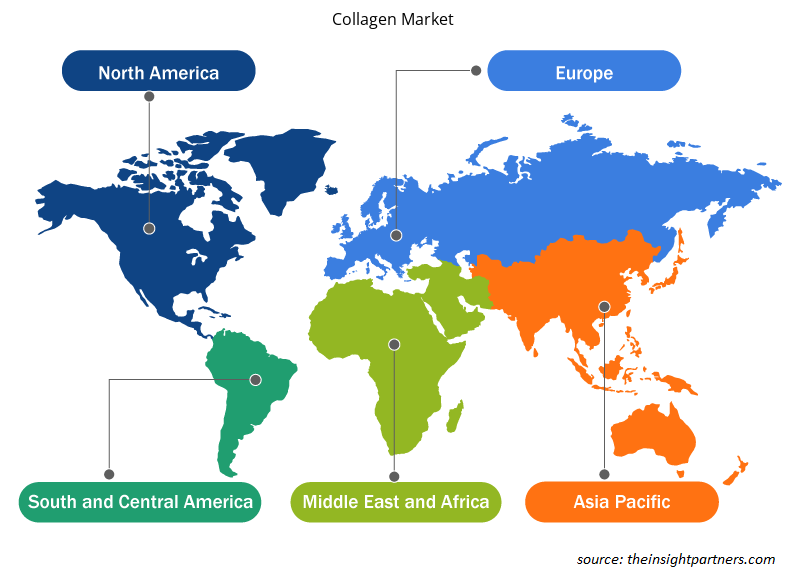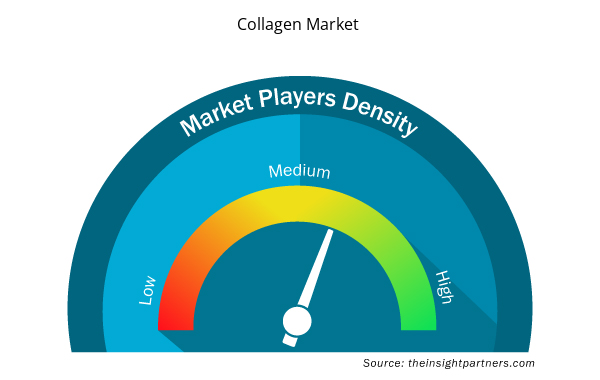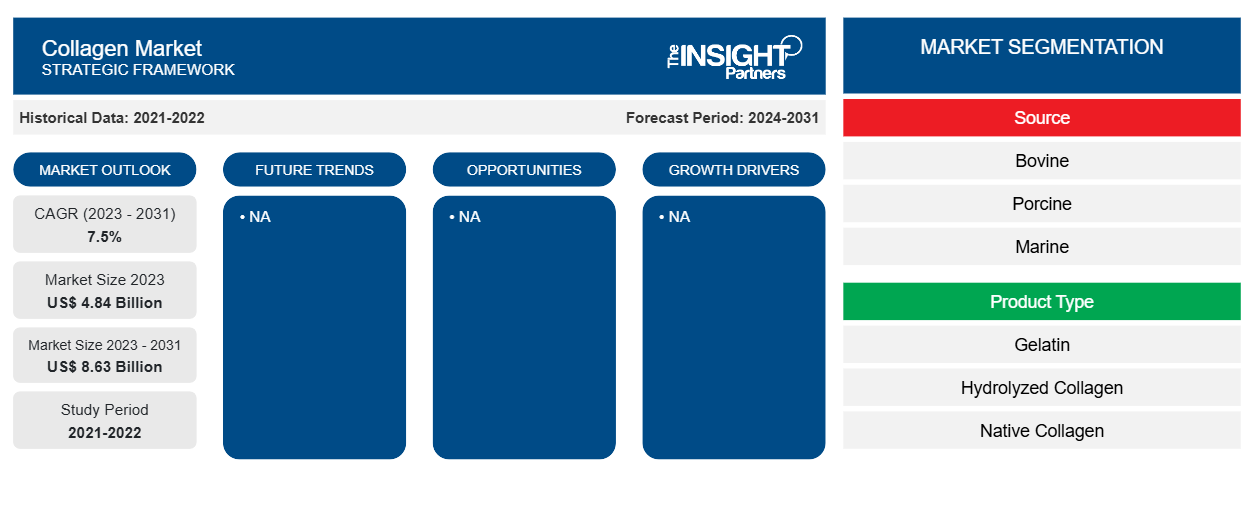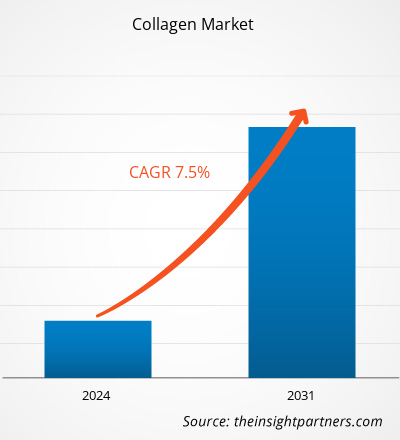胶原蛋白市场规模预计将从 2023 年的 48.4 亿美元增至 2031 年的 86.3 亿美元。预计 2023-2031 年期间,该市场的复合年增长率将达到 7.5%。素食主义的兴起迫使胶原蛋白制造商推出植物性或纯素食胶原蛋白。2020 年,赢创工业利用微生物和发酵工艺开发了纯素食胶原蛋白,无需使用动物源材料。因此,纯素食胶原蛋白正在成为整个胶原蛋白市场的重要趋势。
胶原蛋白市场分析
胶原蛋白是一种结构蛋白,存在于结缔组织、皮肤、肌腱、骨骼、软骨和其他身体部位。它为组织提供结构支撑,并参与细胞功能,如组织愈合、免疫反应、细胞通讯和细胞迁移。胶原蛋白通常来自牛结缔组织或海洋来源。它广泛应用于多个终端行业,包括食品和饮料、药品和保健食品以及个人护理。在食品和饮料行业,胶原蛋白用于酸奶、冰沙混合物、营养棒、即饮饮料等。含胶原蛋白的食品和饮料可提高体内胶原蛋白的水平;此外,它们还有助于修复皮肤纹理、改善骨骼和肌肉健康以及强化关节。消费者对胶原蛋白健康益处的认识不断提高,推动了对含胶原蛋白的食品和饮料的需求。
胶原蛋白市场概况
胶原蛋白是人类和动物(如牛、猪和海洋动物)中最重要的结构蛋白之一。在人类中,胶原蛋白占总蛋白质含量的 30%。随着人类年龄的增长,身体产生的胶原蛋白会减少,这会对骨骼健康和皮肤及头发健康产生负面影响。因此,营养师和保健医生建议食用胶原蛋白诱导补充剂、食品和饮料。此外,患有骨质疏松症的人数正在迅速增加。女性骨质疏松症比男性更为普遍。绝经后女性患骨质疏松症的几率最高。胶原蛋白补充剂可增加体内的骨矿物质密度,有助于治疗骨质疏松症。所有这些因素都在推动全球胶原蛋白市场的增长。
定制此报告以满足您的需求
您可以免费定制任何报告,包括本报告的部分内容、国家级分析、Excel 数据包,以及为初创企业和大学提供优惠和折扣
- 获取此报告的关键市场趋势。这个免费样品将包括数据分析,从市场趋势到估计和预测。
胶原蛋白市场驱动因素和机遇
骨质疏松症患病率上升利好市场
骨质疏松症是一种因骨矿物质密度和骨量减少而引起的疾病,会导致骨骼强度下降并增加骨折风险。在严重的骨质疏松症病例中,骨骼会变得脆弱易碎,甚至轻微的压力(例如倾斜或咳嗽)都会导致骨折。髋部、腕部和脊柱是骨质疏松症相关骨折最常见的部位。根据国际骨质疏松基金会的数据,2019 年英国约有 5.2% 的人口被诊断出患有骨质疏松症。此外,到 2050 年,亚洲很可能占全球报告的骨质疏松性髋部骨折总数的一半以上。
个人护理产品和营养美容品对胶原蛋白的需求激增
美容和个人护理行业正在快速增长。亚太地区、北美和欧洲是美容和个人护理产品市场占据主导地位的地区。如今,人们越来越注重皮肤护理和头发护理,因此人们更青睐能够提供营养和深层补水的产品。随着年龄的增长,人体产生的胶原蛋白会减少,从而产生皱纹、皮肤松弛和脱水等皮肤问题。饮酒、吸烟和压力会进一步加速皮肤的老化过程。这些问题可以通过补充胶原蛋白肽来解决。美国食品和药物管理局 (FDA) 已批准使用胶原蛋白植入物来治疗痤疮疤痕和抚平皱纹。水解胶原蛋白特别用于多种个人护理和化妆品中。在护发产品中,胶原蛋白有助于改善头发质地,强化头发,防止断裂。它还可以通过减少头皮剥落和恢复柔软度来防止头皮干燥。
胶原蛋白市场报告细分分析
有助于胶原蛋白市场分析的关键部分是来源、产品类型和应用。
- 根据来源,胶原蛋白市场分为牛胶原蛋白、猪胶原蛋白、海洋胶原蛋白、植物胶原蛋白/纯素胶原蛋白和其他胶原蛋白。2023 年,牛胶原蛋白占据了最大的市场份额。
- 根据产品类型,市场分为明胶、水解胶原蛋白和天然胶原蛋白。明胶部分在 2023 年占据了最大的市场份额。
- 从应用方面来看,市场细分为食品和饮料、药品和营养品、个人护理等。2023 年,药品和营养品领域占据了市场主导地位。
胶原蛋白市场份额按地区分析
胶原蛋白市场报告的地理范围主要分为五个区域:北美、亚太、欧洲、中东和非洲、南美/南美和中美。
2023 年,亚太地区占据了胶原蛋白市场的主导地位。由于社交媒体的深远影响,该地区的新兴经济体正在见证注重健康的消费者数量的激增。营养补充剂需求的不断增长以及个人和运动营养产品中胶原蛋白的使用量不断增加,推动了亚太地区对胶原蛋白的需求。功能性食品和饮料在注重健康的人群中大受欢迎。由于营养价值高且经济可行性高,胶原蛋白使食品、饮料和膳食补充剂公司能够满足市场对蛋白质补充的无限目标。
胶原蛋白市场区域洞察
Insight Partners 的分析师已详细解释了预测期内影响胶原蛋白市场的区域趋势和因素。本节还讨论了北美、欧洲、亚太地区、中东和非洲以及南美和中美洲的胶原蛋白市场细分和地理位置。

- 获取胶原蛋白市场的区域特定数据
胶原蛋白市场报告范围
| 报告属性 | 细节 |
|---|---|
| 2023 年的市场规模 | 48.4 亿美元 |
| 2031 年市场规模 | 86.3亿美元 |
| 全球复合年增长率(2023 - 2031) | 7.5% |
| 史料 | 2021-2022 |
| 预测期 | 2024-2031 |
| 涵盖的领域 | 按来源
|
| 覆盖地区和国家 | 北美
|
| 市场领导者和主要公司简介 |
|
胶原蛋白市场参与者密度:了解其对业务动态的影响
胶原蛋白市场正在快速增长,这得益于终端用户需求的不断增长,而这些需求又源于消费者偏好的不断变化、技术进步以及对产品益处的认识不断提高等因素。随着需求的增加,企业正在扩大其产品范围,进行创新以满足消费者的需求,并利用新兴趋势,从而进一步推动市场增长。
市场参与者密度是指在特定市场或行业内运营的企业或公司的分布情况。它表明在给定市场空间中,相对于其规模或总市场价值,有多少竞争对手(市场参与者)存在。
在胶原蛋白市场运营的主要公司有:
- 嘉利达公司
- 盖尔尼克斯
- 拉皮明胶公司
- Nippi 公司
- 新田明胶股份有限公司
免责声明:上面列出的公司没有按照任何特定顺序排列。

- 了解胶原蛋白市场顶级关键参与者概况
胶原蛋白市场新闻和最新发展
胶原蛋白市场通过收集一级和二级研究后的定性和定量数据进行评估,其中包括重要的公司出版物、协会数据和数据库。下面列出了胶原蛋白市场的一些发展情况:
- Darling Ingredients 完成对巴西明胶和胶原蛋白生产商 Gelnex 的收购(来源:Darling Ingredients,新闻稿,2023 年)
Lapi Gelatine 是 Lapi Group 控股公司旗下的一家公司,收购了西班牙 Juncà Gelatine(来源:Lapi Gelatine,新闻稿,2021 年)
胶原蛋白市场报告覆盖范围和交付成果
“胶原蛋白市场规模和预测(2021-2031)”报告对以下领域进行了详细的市场分析:
- 胶原蛋白市场规模及全球、区域和国家层面所有主要细分市场的预测
- 胶原蛋白市场趋势以及市场动态,如驱动因素、限制因素和关键机遇
- 详细的 PEST/波特五力分析和 SWOT 分析
- 胶原蛋白市场分析涵盖主要市场趋势、全球和区域框架、主要参与者、法规和最新市场发展
- 行业格局和竞争分析,涵盖市场集中度、热图分析、知名参与者以及胶原蛋白市场的最新发展
- 详细的公司简介
- 历史分析(2 年)、基准年、预测(7 年)及复合年增长率
- PEST 和 SWOT 分析
- 市场规模价值/数量 - 全球、区域、国家
- 行业和竞争格局
- Excel 数据集



Report Coverage
Revenue forecast, Company Analysis, Industry landscape, Growth factors, and Trends

Segment Covered
This text is related
to segments covered.

Regional Scope
North America, Europe, Asia Pacific, Middle East & Africa, South & Central America

Country Scope
This text is related
to country scope.
Trends and growth analysis reports related to Food and Beverages : READ MORE..
The Insight Partners performs research in 4 major stages: Data Collection & Secondary Research, Primary Research, Data Analysis and Data Triangulation & Final Review.
- Data Collection and Secondary Research:
As a market research and consulting firm operating from a decade, we have published and advised several client across the globe. First step for any study will start with an assessment of currently available data and insights from existing reports. Further, historical and current market information is collected from Investor Presentations, Annual Reports, SEC Filings, etc., and other information related to company’s performance and market positioning are gathered from Paid Databases (Factiva, Hoovers, and Reuters) and various other publications available in public domain.
Several associations trade associates, technical forums, institutes, societies and organization are accessed to gain technical as well as market related insights through their publications such as research papers, blogs and press releases related to the studies are referred to get cues about the market. Further, white papers, journals, magazines, and other news articles published in last 3 years are scrutinized and analyzed to understand the current market trends.
- Primary Research:
The primarily interview analysis comprise of data obtained from industry participants interview and answers to survey questions gathered by in-house primary team.
For primary research, interviews are conducted with industry experts/CEOs/Marketing Managers/VPs/Subject Matter Experts from both demand and supply side to get a 360-degree view of the market. The primary team conducts several interviews based on the complexity of the markets to understand the various market trends and dynamics which makes research more credible and precise.
A typical research interview fulfils the following functions:
- Provides first-hand information on the market size, market trends, growth trends, competitive landscape, and outlook
- Validates and strengthens in-house secondary research findings
- Develops the analysis team’s expertise and market understanding
Primary research involves email interactions and telephone interviews for each market, category, segment, and sub-segment across geographies. The participants who typically take part in such a process include, but are not limited to:
- Industry participants: VPs, business development managers, market intelligence managers and national sales managers
- Outside experts: Valuation experts, research analysts and key opinion leaders specializing in the electronics and semiconductor industry.
Below is the breakup of our primary respondents by company, designation, and region:

Once we receive the confirmation from primary research sources or primary respondents, we finalize the base year market estimation and forecast the data as per the macroeconomic and microeconomic factors assessed during data collection.
- Data Analysis:
Once data is validated through both secondary as well as primary respondents, we finalize the market estimations by hypothesis formulation and factor analysis at regional and country level.
- Macro-Economic Factor Analysis:
We analyse macroeconomic indicators such the gross domestic product (GDP), increase in the demand for goods and services across industries, technological advancement, regional economic growth, governmental policies, the influence of COVID-19, PEST analysis, and other aspects. This analysis aids in setting benchmarks for various nations/regions and approximating market splits. Additionally, the general trend of the aforementioned components aid in determining the market's development possibilities.
- Country Level Data:
Various factors that are especially aligned to the country are taken into account to determine the market size for a certain area and country, including the presence of vendors, such as headquarters and offices, the country's GDP, demand patterns, and industry growth. To comprehend the market dynamics for the nation, a number of growth variables, inhibitors, application areas, and current market trends are researched. The aforementioned elements aid in determining the country's overall market's growth potential.
- Company Profile:
The “Table of Contents” is formulated by listing and analyzing more than 25 - 30 companies operating in the market ecosystem across geographies. However, we profile only 10 companies as a standard practice in our syndicate reports. These 10 companies comprise leading, emerging, and regional players. Nonetheless, our analysis is not restricted to the 10 listed companies, we also analyze other companies present in the market to develop a holistic view and understand the prevailing trends. The “Company Profiles” section in the report covers key facts, business description, products & services, financial information, SWOT analysis, and key developments. The financial information presented is extracted from the annual reports and official documents of the publicly listed companies. Upon collecting the information for the sections of respective companies, we verify them via various primary sources and then compile the data in respective company profiles. The company level information helps us in deriving the base number as well as in forecasting the market size.
- Developing Base Number:
Aggregation of sales statistics (2020-2022) and macro-economic factor, and other secondary and primary research insights are utilized to arrive at base number and related market shares for 2022. The data gaps are identified in this step and relevant market data is analyzed, collected from paid primary interviews or databases. On finalizing the base year market size, forecasts are developed on the basis of macro-economic, industry and market growth factors and company level analysis.
- Data Triangulation and Final Review:
The market findings and base year market size calculations are validated from supply as well as demand side. Demand side validations are based on macro-economic factor analysis and benchmarks for respective regions and countries. In case of supply side validations, revenues of major companies are estimated (in case not available) based on industry benchmark, approximate number of employees, product portfolio, and primary interviews revenues are gathered. Further revenue from target product/service segment is assessed to avoid overshooting of market statistics. In case of heavy deviations between supply and demand side values, all thes steps are repeated to achieve synchronization.
We follow an iterative model, wherein we share our research findings with Subject Matter Experts (SME’s) and Key Opinion Leaders (KOLs) until consensus view of the market is not formulated – this model negates any drastic deviation in the opinions of experts. Only validated and universally acceptable research findings are quoted in our reports.
We have important check points that we use to validate our research findings – which we call – data triangulation, where we validate the information, we generate from secondary sources with primary interviews and then we re-validate with our internal data bases and Subject matter experts. This comprehensive model enables us to deliver high quality, reliable data in shortest possible time.


 获取此报告的免费样本
获取此报告的免费样本